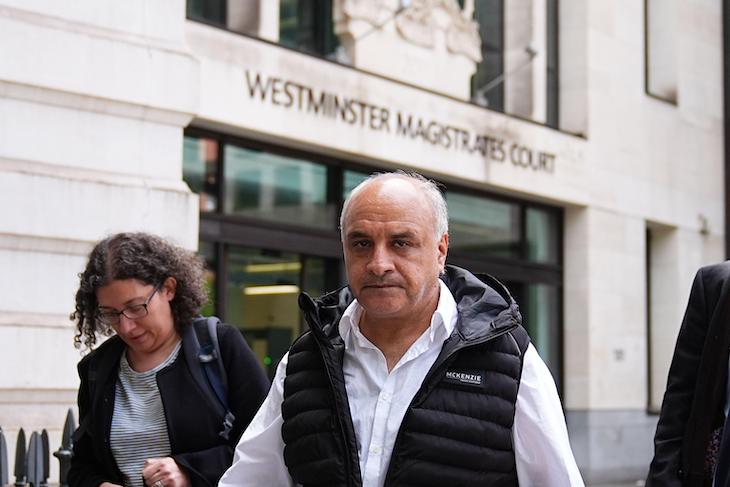Defenders of free expression can breathe a collective sigh of relief. Hamit Coskun – the man who burnt a Quran outside the Turkish Consulate in London in February and was found guilty of a ‘religiously aggravated public order offence’ – had his conviction overturned at Southwark Crown Court on Friday.
People are still scared to blaspheme against Islam. We already live under unofficial blasphemy laws enforced by fear
Coskun exercised his freedom of conscience and felt the iron fist of the law. His original trial even bordered on victim-blaming. The fact that he was attacked on the street by a Muslim man wielding a knife was effectively used against him, with the judge adducing this as proof that Coskun had engaged in ‘disorderly behaviour’.
Thankfully, common sense prevailed. At Southwark Crown Court, Mr Justice Bennathan ruled that free expression ‘must include the right to express views that offend, shock or disturb’, and that includes a burning dislike of a holy book. Backdoor blasphemy laws have no place in twenty-first-century Britain, even if they come dolled up in the language of public order.
But despite this ruling, people are still scared to blaspheme against Islam. We already live under unofficial blasphemy laws enforced by fear.
In a survey that surprised no one, research conducted by Ipsos UK found that talking freely about Islam is ‘feared more than any other religion’. Thirty-eight per cent feel they have to self-censor when talking about Islamic topics. At the same time, around 71 per cent of British Muslims feel that people should be sensitive about causing offence when discussing their religion.
The reluctance to speak openly about Islam partly stems from a people-pleasing instinct not to ruffle feathers. But it’s largely because the threat of violence, even death, stalks blasphemy against Islam.
There’s the Batley Grammar scandal in 2021, where a religious-studies teacher at the West Yorkshire school, keen to spark a conversation about religious extremism, showed his pupils the 2015 Charlie Hebdo cartoons of the Prophet Muhammad.
A group called the Muslim Action Forum helped organise protests outside the school gates. More than 120 imams and Islamic scholars signed an open letter, calling on all ‘civilised members of our society to unequivocally condemn’ the teacher. (Call me old-fashioned, but ‘civilised members of our society’ do not intimidate teachers over cartoons.)
Death threats were issued and the teacher was swiftly suspended. He and his family were forced into hiding, where they remain today. As far as we can see, nothing is being done to remedy their plight.
Headteacher Gary Kibble apologised ‘unequivocally’, which is ironic given the school motto is ‘bravely not cowardly’. Tracey Brabin – then Labour MP for Batley and Spen, now mayor of West Yorkshire – welcomed the apology and condemned those who sought to ‘fan the flames of this incident’. Teaching unions were shamefully silent.
A de facto blasphemy law was enforced in Batley. But can you blame those who capitulated? A terrifying precedent had been set just a few months before, when French schoolteacher Samuel Paty was beheaded outside his own school for showing pupils the same cartoons.
This unholy alliance between religious intolerance and institutional cowardice was reinforced at Kettlethorpe High School in Wakefield in 2023. A teenage boy brought a Quran into school and during a tussle in the playground, the cover sustained a slight tear and some pages were scuffed.
What should have been a trivial incident soon escalated. Usman Ali, a local politician, called on the government to punish this ‘terrible provocation’. In an extraordinary turn of events, the boy was suspended along with his friends and received death threats.
Headteacher Tudor Griffiths issued a quailing statement reassuring the community that ‘the holy book remains fully intact’ even if the boys ‘did not treat the Quran with the respect’ it deserved. Kettlethorpe, he claimed, is ‘an inclusive school where we want all our pupils to feel safe and secure’. What about the pupil who was threatened with death for dropping a book?
A kangaroo court was convened in a mosque, where police sat alongside community leaders, a local councillor and an imam. Facing an audience of outraged men, the boy’s seemingly petrified mother had to don a makeshift hijab, apologise abjectly on behalf of her son, and beg for her family’s safety.
Violence was avoided in Wakefield, but it seems only by surrender to seventh-century Arabic notions of blasphemy. Freedom of conscience was thrown under the bus and death threats went unpunished. Such incidents have a profoundly censorious effect, rippling across society.
This culture of fear has been decades in the making. In 1989, a chill wind blew across Britain when Ayatollah Khomeini condemned Salman Rushdie to death for writing The Satanic Verses.
Fast forward to the present day. We have networks of anti-blasphemy activists. We have schools and councils capitulating to mobs outside the gates and issuing grovelling apologies. We have police forces that would rather go after the blasphemers than the people threatening them with death.
After Hamit Coskun’s victory in court, we can safely say that Quran-burning isn’t yet illegal in this country. But it’s going to take more than one court ruling to douse the flames of hardline Islamic intolerance.







Comments